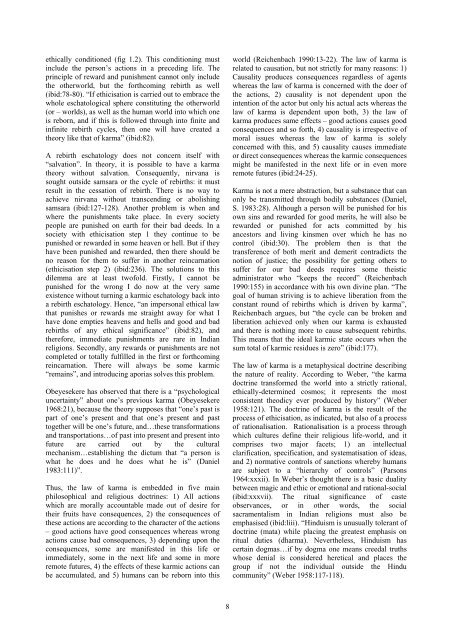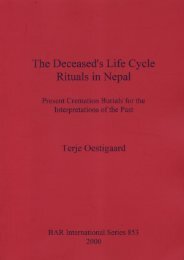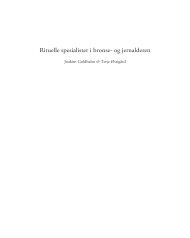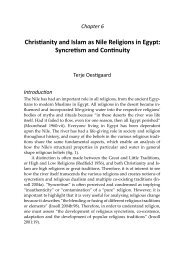Cremation, Caste, and Cosmogony in Karmic Traditions.
Cremation, Caste, and Cosmogony in Karmic Traditions.
Cremation, Caste, and Cosmogony in Karmic Traditions.
Create successful ePaper yourself
Turn your PDF publications into a flip-book with our unique Google optimized e-Paper software.
ethically conditioned (fig 1.2). This condition<strong>in</strong>g must<br />
<strong>in</strong>clude the person’s actions <strong>in</strong> a preced<strong>in</strong>g life. The<br />
pr<strong>in</strong>ciple of reward <strong>and</strong> punishment cannot only <strong>in</strong>clude<br />
the otherworld, but the forthcom<strong>in</strong>g rebirth as well<br />
(ibid:78-80). “If ethicisation is carried out to embrace the<br />
whole eschatological sphere constitut<strong>in</strong>g the otherworld<br />
(or – worlds), as well as the human world <strong>in</strong>to which one<br />
is reborn, <strong>and</strong> if this is followed through <strong>in</strong>to f<strong>in</strong>ite <strong>and</strong><br />
<strong>in</strong>f<strong>in</strong>ite rebirth cycles, then one will have created a<br />
theory like that of karma” (ibid:82).<br />
A rebirth eschatology does not concern itself with<br />
“salvation”. In theory, it is possible to have a karma<br />
theory without salvation. Consequently, nirvana is<br />
sought outside samsara or the cycle of rebirths: it must<br />
result <strong>in</strong> the cessation of rebirth. There is no way to<br />
achieve nirvana without transcend<strong>in</strong>g or abolish<strong>in</strong>g<br />
samsara (ibid:127-128). Another problem is when <strong>and</strong><br />
where the punishments take place. In every society<br />
people are punished on earth for their bad deeds. In a<br />
society with ethicisation step 1 they cont<strong>in</strong>ue to be<br />
punished or rewarded <strong>in</strong> some heaven or hell. But if they<br />
have been punished <strong>and</strong> rewarded, then there should be<br />
no reason for them to suffer <strong>in</strong> another re<strong>in</strong>carnation<br />
(ethicisation step 2) (ibid:236). The solutions to this<br />
dilemma are at least twofold. Firstly, I cannot be<br />
punished for the wrong I do now at the very same<br />
existence without turn<strong>in</strong>g a karmic eschatology back <strong>in</strong>to<br />
a rebirth eschatology. Hence, “an impersonal ethical law<br />
that punishes or rewards me straight away for what I<br />
have done empties heavens <strong>and</strong> hells <strong>and</strong> good <strong>and</strong> bad<br />
rebirths of any ethical significance” (ibid:82), <strong>and</strong><br />
therefore, immediate punishments are rare <strong>in</strong> Indian<br />
religions. Secondly, any rewards or punishments are not<br />
completed or totally fulfilled <strong>in</strong> the first or forthcom<strong>in</strong>g<br />
re<strong>in</strong>carnation. There will always be some karmic<br />
“rema<strong>in</strong>s”, <strong>and</strong> <strong>in</strong>troduc<strong>in</strong>g aporias solves this problem.<br />
Obeyesekere has observed that there is a “psychological<br />
uncerta<strong>in</strong>ty” about one’s previous karma (Obeyesekere<br />
1968:21), because the theory supposes that “one’s past is<br />
part of one’s present <strong>and</strong> that one’s present <strong>and</strong> past<br />
together will be one’s future, <strong>and</strong>…these transformations<br />
<strong>and</strong> transportations…of past <strong>in</strong>to present <strong>and</strong> present <strong>in</strong>to<br />
future are carried out by the cultural<br />
mechanism…establish<strong>in</strong>g the dictum that “a person is<br />
what he does <strong>and</strong> he does what he is” (Daniel<br />
1983:111)”.<br />
Thus, the law of karma is embedded <strong>in</strong> five ma<strong>in</strong><br />
philosophical <strong>and</strong> religious doctr<strong>in</strong>es: 1) All actions<br />
which are morally accountable made out of desire for<br />
their fruits have consequences, 2) the consequences of<br />
these actions are accord<strong>in</strong>g to the character of the actions<br />
– good actions have good consequences whereas wrong<br />
actions cause bad consequences, 3) depend<strong>in</strong>g upon the<br />
consequences, some are manifested <strong>in</strong> this life or<br />
immediately, some <strong>in</strong> the next life <strong>and</strong> some <strong>in</strong> more<br />
remote futures, 4) the effects of these karmic actions can<br />
be accumulated, <strong>and</strong> 5) humans can be reborn <strong>in</strong>to this<br />
8<br />
world (Reichenbach 1990:13-22). The law of karma is<br />
related to causation, but not strictly for many reasons: 1)<br />
Causality produces consequences regardless of agents<br />
whereas the law of karma is concerned with the doer of<br />
the actions, 2) causality is not dependent upon the<br />
<strong>in</strong>tention of the actor but only his actual acts whereas the<br />
law of karma is dependent upon both, 3) the law of<br />
karma produces same effects – good actions causes good<br />
consequences <strong>and</strong> so forth, 4) causality is irrespective of<br />
moral issues whereas the law of karma is solely<br />
concerned with this, <strong>and</strong> 5) causality causes immediate<br />
or direct consequences whereas the karmic consequences<br />
might be manifested <strong>in</strong> the next life or <strong>in</strong> even more<br />
remote futures (ibid:24-25).<br />
Karma is not a mere abstraction, but a substance that can<br />
only be transmitted through bodily substances (Daniel,<br />
S. 1983:28). Although a person will be punished for his<br />
own s<strong>in</strong>s <strong>and</strong> rewarded for good merits, he will also be<br />
rewarded or punished for acts committed by his<br />
ancestors <strong>and</strong> liv<strong>in</strong>g k<strong>in</strong>smen over which he has no<br />
control (ibid:30). The problem then is that the<br />
transference of both merit <strong>and</strong> demerit contradicts the<br />
notion of justice; the possibility for gett<strong>in</strong>g others to<br />
suffer for our bad deeds requires some theistic<br />
adm<strong>in</strong>istrator who “keeps the record” (Reichenbach<br />
1990:155) <strong>in</strong> accordance with his own div<strong>in</strong>e plan. “The<br />
goal of human striv<strong>in</strong>g is to achieve liberation from the<br />
constant round of rebirths which is driven by karma”,<br />
Reichenbach argues, but “the cycle can be broken <strong>and</strong><br />
liberation achieved only when our karma is exhausted<br />
<strong>and</strong> there is noth<strong>in</strong>g more to cause subsequent rebirths.<br />
This means that the ideal karmic state occurs when the<br />
sum total of karmic residues is zero” (ibid:177).<br />
The law of karma is a metaphysical doctr<strong>in</strong>e describ<strong>in</strong>g<br />
the nature of reality. Accord<strong>in</strong>g to Weber, “the karma<br />
doctr<strong>in</strong>e transformed the world <strong>in</strong>to a strictly rational,<br />
ethically-determ<strong>in</strong>ed cosmos; it represents the most<br />
consistent theodicy ever produced by history” (Weber<br />
1958:121). The doctr<strong>in</strong>e of karma is the result of the<br />
process of ethicisation, as <strong>in</strong>dicated, but also of a process<br />
of rationalisation. Rationalisation is a process through<br />
which cultures def<strong>in</strong>e their religious life-world, <strong>and</strong> it<br />
comprises two major facets; 1) an <strong>in</strong>tellectual<br />
clarification, specification, <strong>and</strong> systematisation of ideas,<br />
<strong>and</strong> 2) normative controls of sanctions whereby humans<br />
are subject to a “hierarchy of controls” (Parsons<br />
1964:xxxii). In Weber’s thought there is a basic duality<br />
between magic <strong>and</strong> ethic or emotional <strong>and</strong> rational-social<br />
(ibid:xxxvii). The ritual significance of caste<br />
observances, or <strong>in</strong> other words, the social<br />
sacramentalism <strong>in</strong> Indian religions must also be<br />
emphasised (ibid:liii). “H<strong>in</strong>duism is unusually tolerant of<br />
doctr<strong>in</strong>e (mata) while plac<strong>in</strong>g the greatest emphasis on<br />
ritual duties (dharma). Nevertheless, H<strong>in</strong>duism has<br />
certa<strong>in</strong> dogmas…if by dogma one means creedal truths<br />
whose denial is considered heretical <strong>and</strong> places the<br />
group if not the <strong>in</strong>dividual outside the H<strong>in</strong>du<br />
community” (Weber 1958:117-118).











![Fullmono-AK [P2118].indd - oestigaard](https://img.yumpu.com/18994998/1/177x260/fullmono-ak-p2118indd-oestigaard.jpg?quality=85)